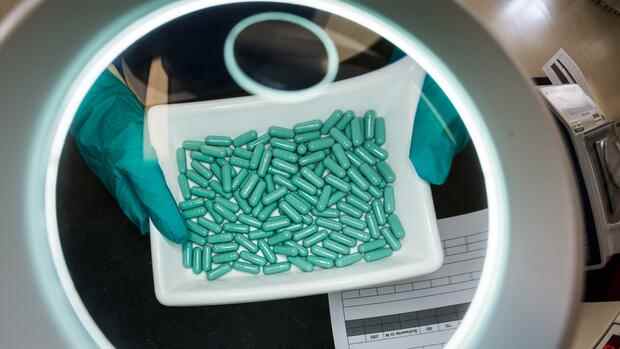Bad Vilbel The Hessian drug manufacturer Stada increased its sales and profit again in 2021 despite the restrictions imposed by the corona pandemic. In the current year, however, the company is preparing for burdens in business in Russia and the Ukraine.
Overall, Stada expects a slight decline in sales and a roughly constant net income for 2022. The war between Russia and Ukraine could have slightly to significantly negative effects on the forecast development, the company writes in its annual report published this Tuesday.
In 2021, Stada had grown in sales by eight percent to 3.25 billion euros. Earnings before interest, taxes, depreciation and amortization (Ebitda) increased by 37 percent to 776.5 million euros, mainly because of the non-recurrence of special effects that had a negative impact on earnings in 2020. Adjusted for these special effects, Ebitda increased by four percent.
In normal times, the company’s successful growth path would have given its owners, the financial investors Bain and Cinven, good conditions for an exit. At the end of last year, there was speculation in financial circles that Stada would soon go public.
Top jobs of the day
Find the best jobs now and
be notified by email.
According to M&A experts, the war in Ukraine will destroy such plans in the short term. Because Stada makes a significant part of its sales in Russia with around 14 percent, in the Ukraine it was previously one percent. How the situation in the region will develop is highly uncertain.
The consequences of the economic sanctions in Russia are also difficult to assess – and therefore not conducive to a stock market story. When asked by the Handelsblatt, Stada owner Cinven did not want to comment on the Ukraine war and the consequences of an exit at Stada.
War in eastern Ukraine has been a burden on business since 2014
According to an analysis by the information service provider Refinitiv, around 350 transactions worth 10.7 billion dollars with Russian participation were pending in mid-March. The Ukraine war is also dampening overall sentiment in the mergers and acquisitions (M&A) industry. High energy and raw material prices are putting a strain on the economy, and the effects on company profits are difficult to assess. As a result, this complicates the valuations of the corporations.
According to its own statements, the company is the fourth-largest supplier of over-the-counter medicines and generic medicines in Europe.
(Photo: STADA Arzneimittel AG)
Stada produces most of the medicines for Russia locally. Two large factories play an important role in supplying medicines to the local Russian population. One is in Nizhny Novgorod, around 400 kilometers east of Moscow, and the other in Obninsk, around 100 kilometers southwest of the capital. A smaller part of the medicines also comes from Serbia or Germany.
Since the drug market in Russia is primarily a self-pay market, growing economic problems for the population are likely to have an impact on the demand for drugs. In addition to essential medicines, Stada also offers dietary supplements in Russia. In addition, a low ruble exchange rate should become a burden in the long run, the drug provider reports in euros.
Since the start of the conflict between Russia and Ukraine in 2014, Stada’s business development has been affected in both the Russian and Ukrainian markets, the company reports. “The mixture of exchange rate pressure and the decline in the Russian economy will definitely leave its mark, but we will master it thanks to our broad geographical positioning and our broad portfolio,” CEO Peter Goldschmidt told the Handelsblatt in early March.
Acquisitions complement brand business
The largest segment at STADA is the consumer healthcare sector with many branded products, including over-the-counter products. It represents around 40 percent of group sales. The segment grew by 15 percent to almost 1.3 billion euros in sales. The business with copycat drugs (generics) increased by two percent to 1.33 billion euros.
>>> Read here: These German companies want to keep doing business with Russia – even if it gets more complicated
Special pharmaceuticals grew by nine percent to 639 million euros. These include, for example, imitation products of biopharmaceuticals (biosimilars), but also, for example, therapies against Parkinson’s disease.
Stada’s profit rose by around 45 percent to almost 264 million euros in 2021. Here, too, the special effects of the previous year had an effect, which mainly consisted of exchange rate expenses from a loan for the acquisition of the Takeda portfolio, expenses for provisions for damages and effects from the deconsolidation. Stada employs around 12,500 people worldwide.
Stada was acquired in 2017 by the financial investors Bain and Cinven in a deal worth 5.3 billion euros. It was delisted at the end of 2018. In the years that followed, Stada greatly expanded its portfolio with various acquisitions. At the beginning of 2020, for example, Stada expanded its footprint in Russia with the purchase of a drug portfolio from Takeda with a total value of around 660 million dollars.
In the middle of last year, Stada acquired 16 consumer healthcare brands in 13 countries from Sanofi, including brands for cold and flu medicines, skin care products and dietary supplements such as Silomat, Mitosyl and Frubiase.
With acquisitions like these, Stada was able to compensate for the decline in sales of cold and flu medicines. Because during the pandemic, the cold and flu season was less severe because of the protective measures.
More: Difficult role for Stada and Bionorica: drug manufacturers continue to deliver to Russia
